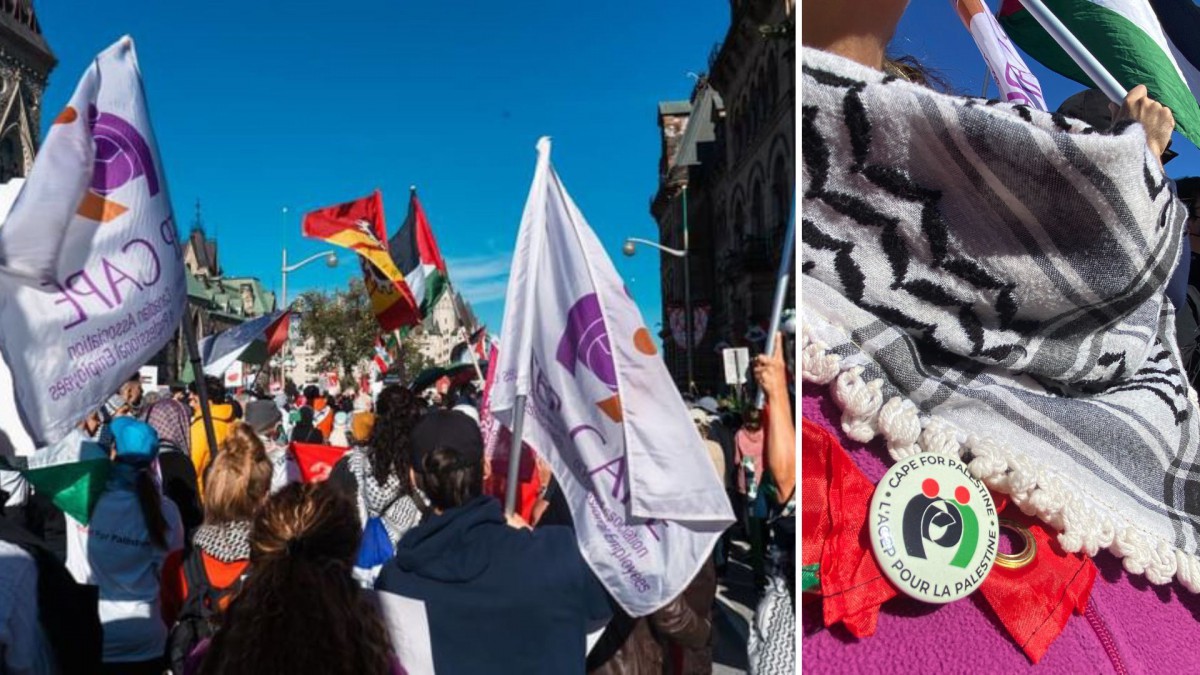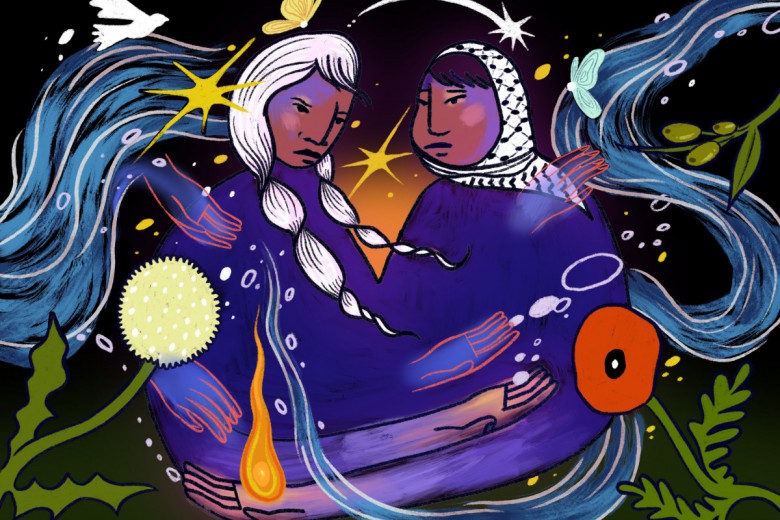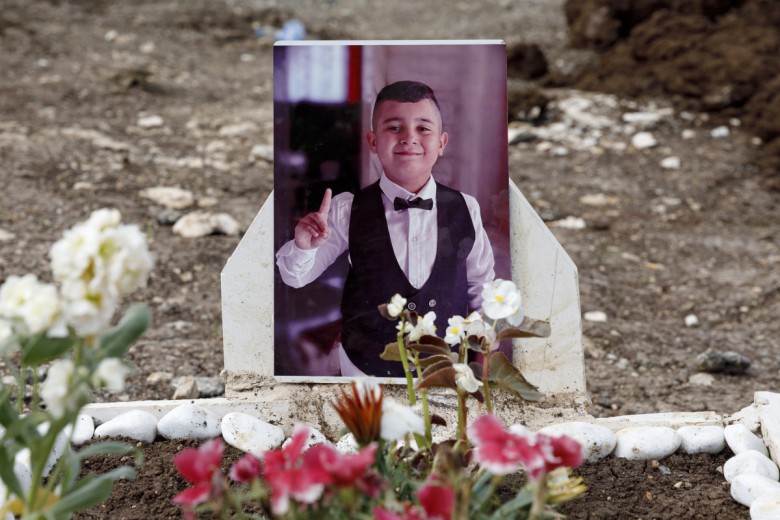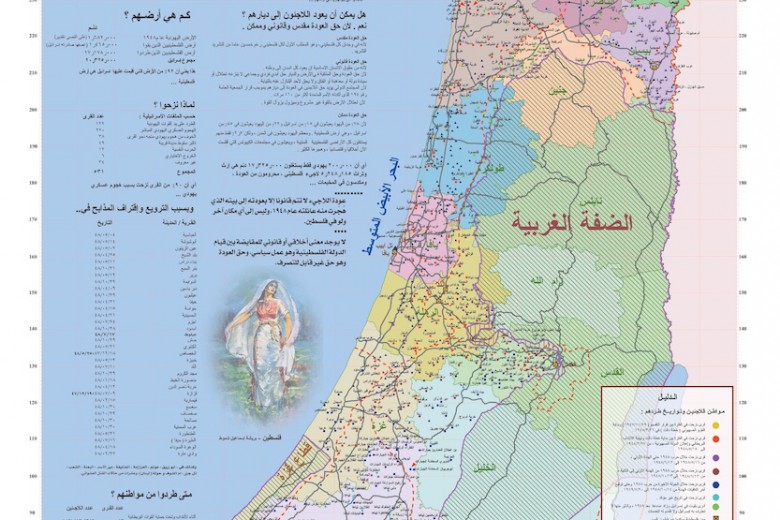Around 8 p.m. one evening in early November last year, a group of six federal public servants closed off an online video call with a plan to meet again exactly one week later at the exact same time. The agenda? To figure out what they could do from inside the Government of Canada to stop the genocide unfolding in Gaza.
As members of the third-largest federal public service union, the Canadian Association of Professional Employees (CAPE), a notoriously conservative union with a history of business-model unionism and a more recent past of controversial former presidents, forcing national union leadership to take any stand on Palestine was a long shot – but one they were willing to attempt.
After weeks of unprecedented bombings on Gaza and nothing but an email from the head of the public service with a passing mention of Islamophobia (and none of anti-Palestinian racism), CAPE members were galvanized into seeking an outlet for their rage, grief, and disappointment with Canada – both as a country and an employer.
Leftists’ long-standing discomfort with Palestine has contributed to isolating Palestinian solidarity activities over the years to the point of stymying union-led solidarity initiatives at local and national levels.
The combination of a silent union and unreliable government leadership made starkly obvious the urgency to advance meaningful Palestinian solidarity in the federal public service and CAPE for Palestine (in association with Canada’s Labour 4 Palestine) was established as a union caucus in November 2023. But even with newly elected national executive leadership at CAPE taking office January 1, 2024 and a growing CAPE for Palestine membership, the question on everyone’s mind was “What does Palestinian solidarity in the federal public service even look like?”
Delivering resolutions
Despite a noteworthy history of Canadian labour participation in the call for boycotts, divestment, and sanctions (BDS) in support of the anti-apartheid movement in South Africa in the 1980s, unions have been slow to show consistent support for Palestine. Leftists’ long-standing discomfort with Palestine has contributed to isolating Palestinian solidarity activities over the years to the point of stymying union-led solidarity initiatives at local and national levels.
Intentional or not, while progressives continue to hot potato the ‘issue’ of Palestine, only a handful of Canadian unions had committed to BDS for Palestine prior to 2023. In the federal public service context, the Public Service Alliance of Canada (PSAC) passed a BDS resolution in 2012 that simply adopted a “position in favour of lasting peace in the Middle-East [sic]” and supported the BDS “movement” but included no clear articulation of what that might entail or obligate the union to do.
Similarly, the Canadian Union of Postal Workers (CUPW), hailed for their resistance against South African apartheid in the 1980s across Canada, saw their BDS resolution pass in 2008. One of the earliest national union adopters of BDS in Canada, CUPW took several steps to uphold their commitment over the subsequent near decade (including support of a project working with Palestinian postal workers and of the Stop the Wall project), but efforts later slowed.
Instead, most [unions] are still opting for intermittent statements of support whereby Palestine is couched in generic human rights language that has been neutralized to fit under broad social justice responsibilities.
While both PSAC and CUPW made statements of support for Palestinian solidarity last fall, the absence of on-the-ground mobilizing for years prior has rendered these recent acknowledgements symbolically meaningful but limited in their ongoing applicability.
Despite an uptick in national and provincial union resolutions in the mid-2010s on the heels of Israeli bombings of Gaza in 2008-2009, widespread worker-focused awareness and literacy of Palestinian solidarity within Canadian labour has not seemed to take hold.
October 2023 made this discrepancy undeniable and unions continue to be confronted by this reality even a year later as they struggle with efforts to advance inter-union coordination. In the face of emboldened Zionist conflations of anti-Semitism and anti-Zionism, unions along with the Canadian Labour Congress are hesitating to put material resources behind Palestine solidarity organizing such as basic BDS campaigns, education resources, or direct funding to rank-and-file solidarity groups that could provide an important counter to dangerous misinformation and growing anti-Palestinian racism. Instead, most are still opting for intermittent statements of support whereby Palestine is couched in generic human rights language that has been neutralized to fit under broad social justice responsibilities. And yet, Palestine is unequivocally a labour issue.
Government Workers
As federal public servants, employees are encouraged to refrain from activities that would interfere with administering their duties in an unbiased manner. Federal public servants are required to sign an oath that commits employees to fulfilling their duties faithfully and honestly and, paired with a variously interpreted and inconsistently implemented values and ethics code that states a breach of values will be cause for disciplinary action without defining what “breach” constitutes, the room for employer intimidation and fear of reprisal is immense.
Reliance on individual union leadership sympathies in lieu of a widespread dedicated commitment to Palestine has segregated worker power and made Palestine solidarity increasingly isolated across Canadian labour.
A foundational element of the federal public service is to embody and uphold the apolitical delivery of policies and services to and on behalf of Canadians. But an email sent by the Clerk of the Privy Council on October 11, 2023 expressing sympathy only with Israeli victims and without acknowledgement of Palestinian victims, was anything but apolitical. Despite his passing reference to Islamophobia and the sloppy if inadvertent framing of the attacks as an interreligious conflict, as of October 1, 2024, the Clerk has not sent any communications to employees offering equal recognition of exponentially increased instances of anti-Palestinian racism or acknowledging the several thousands of Palestinian lives brutally lost over the last year.
Neutrality has always benefited the oppressor. In the case of an employer that is complicit in supporting a genocide and illegal occupation of Palestine (as the Canadian government now is due to the continued sales and trading of arms parts and weapons components) while simultaneously erasing Palestinian experience from the public service lexicon, this active weaponizing of neutrality points to an urgent need for collective resistance that can only be met through union activism.
International solidarity, an undisputed pillar of the trade union movement, is premised on the connection of workers across borders, industries, and communities. But it is not just the existence of bosses, shared experience of exploitation, or exchange of labour and skill that links every worker together. Labour itself is undeniably human at its core and it demands that workers uphold this humanity through adherence to unrelenting principles of justice, equality, and safety.
No matter the industry or type of work, our Palestinian comrades are under siege and the call has been made directly from Palestine for trade unionists to mobilize. If the refrain of “an injury to one [worker] is an injury to all” is to be believed, where is our response?
As workers whose labour supports the actions and systems of a government founded on and operating over Indigenous lands and peoples, federal public servants know and are living settler colonialism. Our labour becomes complicit through the nature of our jobs.
Continuing to advance with piecemeal statements and motions from shop floors alone is no longer tenable. Reliance on individual union leadership sympathies in lieu of a widespread dedicated commitment to Palestine has segregated worker power and made Palestine solidarity increasingly isolated across Canadian labour. Even with national level resolutions on the books, unionists cannot rely on trickle-down activism when it comes to Palestine solidarity.
To meet the scale of action being demanded of us by Israel’s genocide and ongoing occupation, the entirety of Canadian labour must dedicate political and material support to Palestinian organizing and explicitly commit to resourcing member education and mobilizing.
Yet with or without material support, it is the responsibility of Canadian workers to take the call for BDS seriously. When the employer is the government, though, the challenges are unique.
As workers whose labour supports the actions and systems of a government founded on and operating over Indigenous lands and peoples, federal public servants know and are living settler colonialism. Our labour becomes complicit through the nature of our jobs. Just as settler colonialism directly and indirectly relies on the participation of labour to meet goals of expansion, accumulation, and occupation, engaging in any Palestinian solidarity work from this positioning cannot ignore the connection between Canada and Israel as violent and occupying states.
Expanding international solidarity in this way deepens the responsibility of public service workers to advocate for Palestine in their workplace and within the union, allowing for the identification of and resistance to systems of oppression that members’ labour contribute to both here and abroad. The duty public servants have as union members to resist when this occurs becomes impossible to ignore.
As workers whose employer is the government, waiting for our bosses to make the ethical decision to stop supporting genocide is futile. It is up to the rank-and-file to unapologetically build the power for Palestinian solidarity from the bottom up.
And while language referencing settler colonial connections regarding Palestine is becoming more common in union settings, for federal public servants, this intersection is unavoidable. When faced with an international situation of any kind, the labour of some CAPE members, mainly policy analysts, is directed toward the research, analysis, and preparation of documents used in the decision-making process for government positions, actions, and policy development. This includes, for example, developing documents that advance Canada’s weapons manufacturing and export contracts. In September 2024, the minister of foreign affairs, Mélanie Joly, claimed to have suspended 30 existing arms permits, but as groups such as Canadians for Justice and Peace in the Middle East point out, this does not impact arms exports that travel through the United States to be used on Palestinians.
To be clear, CAPE members are not making these decisions, but public servants provide information and develop recommendations that senior management, answering to higher and political levels of government, take or leave as Canada determines its support for Israel.
Simultaneously, the labour of other CAPE members is being used to continue delivery of government services, facilitate program operations, advance policy work, and provide translation, among other functions, allowing business to run as usual. After a year of horrific, unrelenting genocide in Palestine and escalating violence in the surrounding region, federal public servants must seriously ask themselves if business as usual is even remotely tenable.
Rank-and-file power
Despite this overwhelming reality, the next steps for Palestine solidarity for public servants are clear. Grounding organizing objectives and goals in the BDS call from Palestinian trade unions is nothing short of critical. Identifying how BDS applies to each workplace, including the federal public service, is what gives the movement – and rank-and-file Palestine organizing – its power. CAPE members must leverage their unique positioning while diligently implementing the roadmap that BDS offers.
As workers whose employer is the government, waiting for our bosses to make the ethical decision to stop supporting genocide is futile. It is up to the rank-and-file to unapologetically build the power for Palestinian solidarity from the bottom up.
Weaponizing language of fiscal responsibility, this new (yet predictable) alliance targets funding as a way to tap into union spending anxieties to make space for an invented narrative of doubt about union leadership accountability and representation of member interests.
CAPE for Palestine’s focus on spreading education and raising awareness of Palestinians’ struggle for liberation across the federal public service builds a critical foundation for lasting change and actively integrates Palestinian solidarity into the fabric of the union and the workplace. Building rank-and-file consciousness and strategically advancing key measures to ensure CAPE leadership is supported in taking national positions on Palestinian solidarity, such as ones outlined in their ceasefire statement in January 2024, has already moved the dial in the federal public service in a few short months.
As CAPE for Palestine has initiated this challenging work, the group has been met equally with grateful voices of support as well as cries for eradication. This past summer, CAPE for Palestine received $5,000 in funding from a union contingency fund from the National Executive Committee (the elected board of CAPE). This money was allocated from this fund by way of a motion and democratic vote by the committee, which passed with a majority, and, like all union funds, is subject to reporting and other accountability measures.
Yet, CAPE’s Zionist faction and union conservatives found common ground and fought to restrict Palestine solidarity by challenging the donation policy and attempting to prevent the funds from being released. Neither the policy nor the budget line have any purview over or relationship to the contingency fund from which the money was pulled.
Weaponizing language of fiscal responsibility, this new (yet predictable) alliance targets funding as a way to tap into union spending anxieties to make space for an invented narrative of doubt about union leadership accountability and representation of member interests. A sign that rank-and-file Palestinian solidarity organizing is working, this fight is expected to continue at CAPE’s annual general meeting this November 2024.
Engaging in Palestinian solidarity as federal public servants has required that we imagine it as we build it. In an arena where playing it safe is as common as it is detrimental, CAPE for Palestine has re-established not just what Palestinian solidarity means within the federal context but also what rank-and-file public servants have a right to do in this space.
Perhaps unintentionally for the original six members of CAPE for Palestine, Palestinian solidarity in the federal public service is no longer a simple fight against anti-Palestinian racism in the workplace or the genocide perpetrated by Israel. This fight will determine the future of Canadian labour’s ability and, more importantly, desire to embody the heart of trade unionism and practise its principles unabashedly.
Palestine is a Canadian worker issue and will continue to be one until and after Palestine is free.
Brabazon is writing as a rank-and-file member organizing Palestine solidarity under CAPE. She is not writing in her capacity as an elected director on the National Executive Committee of CAPE and views and insights expressed here do not represent CAPE National positions.






_780_520_90_s_c1.jpg)
